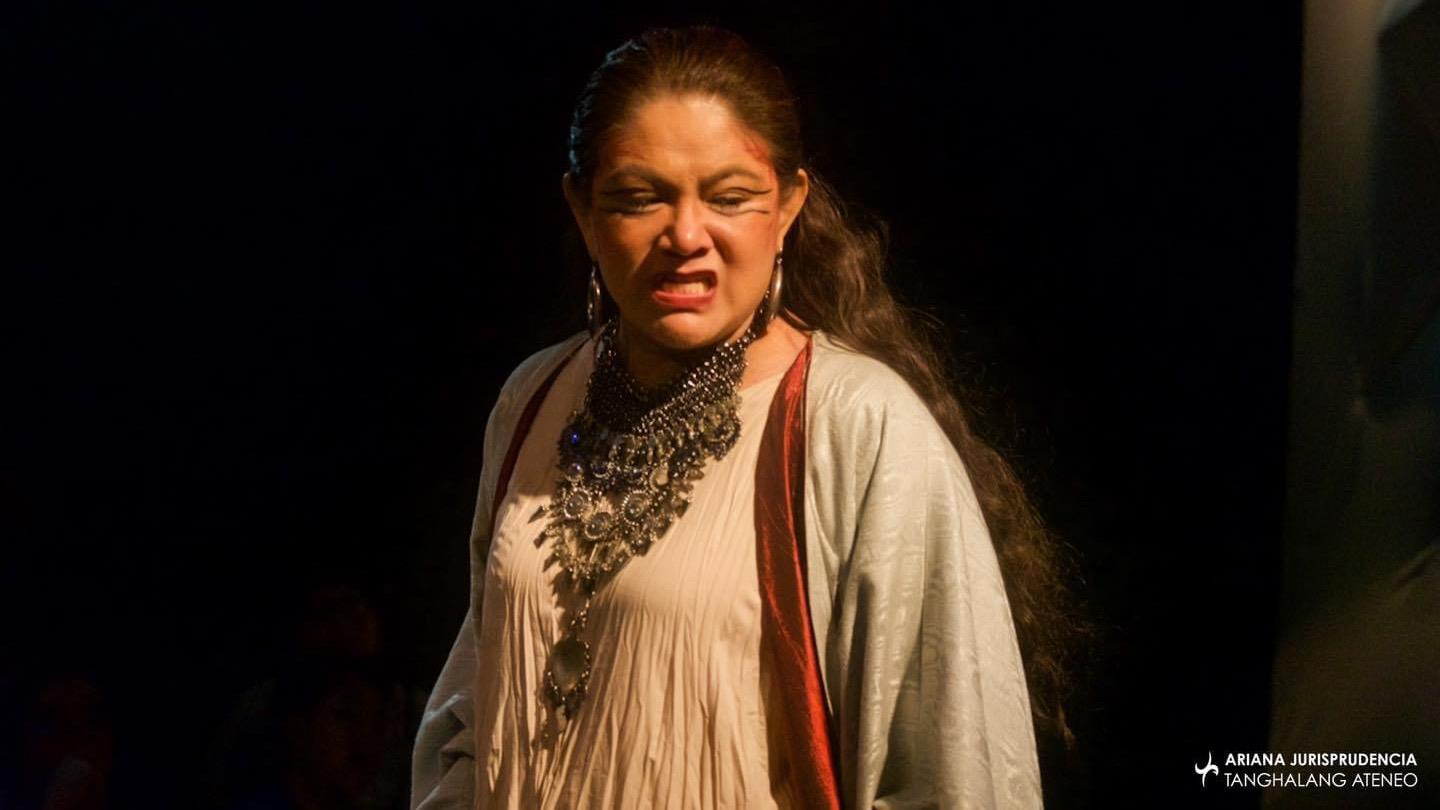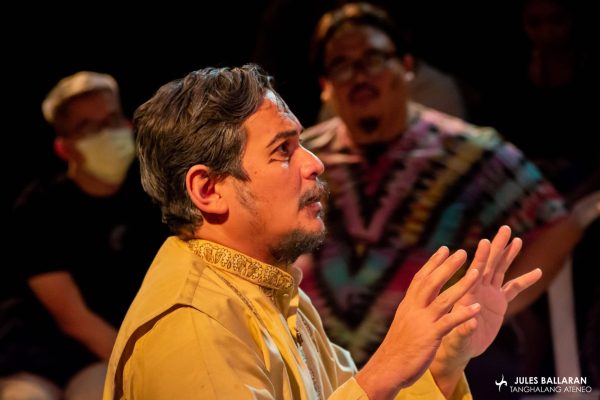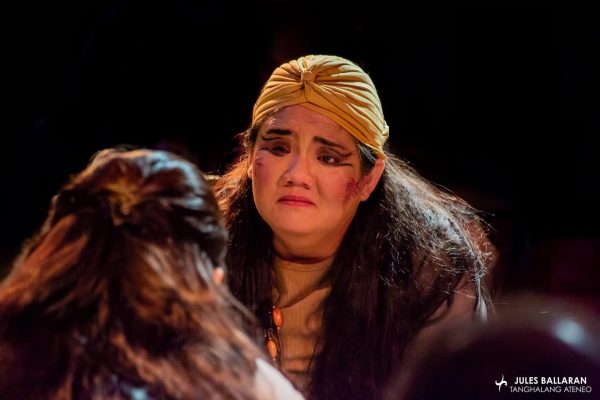
UNI-BASED REVIEW: Tanghalang Ateneo’s ‘Medea’
This especially harsh classical tragedy more than makes up for its visual limits with cutting, poetic language and a cast of electric performers.
The cruelty of classical tragedies is something that contemporary theater productions might choose to approach cautiously. We’ve seen these shows either emphasize a moral stance over the horrific events on stage, or recontextualize a play so as to have its story connect to something urgent and direct. But an equally valid strategy is to just go for it—to show up with the same force the material demands and to portray the monstrous just as it is—which is what Tanghalang Ateneo’s Medea succeeds in doing.
Written by the ancient Greek playwright Euripides and translated to Filipino by Rolando S. Tinio, the play follows the titular character’s plot for revenge against her husband Yason, who has left Medea to marry a princess. TA’s production may not portray this drama in the most visually engaging ways, but a powerhouse cast and the raw strength they draw from Tinio’s words more than make up for it.
Relentless Writing
Even among many other tragedies, Medea is particularly cold-blooded. There are no real forces of good to speak of, as Euripides sets the stage by having the protagonist already firm in her resolve to commit the gravest sins against her deceitful husband. Confined entirely to Medea’s home, the script sees her attended to or visited by one character after another, who serve to deepen Medea’s inconsolable grief and rage even further. The circumstances working against her and whatever freedom she has left are made very clear—but we’re also repeatedly confronted with the question of what degree of vengeance is justified by her situation.

Yan Yuzon as Yason; Photo Credit: Jules Ballaran
The density of Tinio’s translation is daunting at first. But as the production goes on, the poetry of his language adds wit to all the verbal sparring. Because the entire show consists of characters debating, negotiating with, or manipulating each other, Tinio’s words make every exchange a battle of rhetoric as well. Language takes the form of various weapons, be it when Corinthian king Kreon (Chot Kabigting, alternating with Ron Capinding) uses his authority to personally issue ultimatums, or when Yason (Yan Yuzon) uses his smug masculinity to neuter Medea’s anger, or when Medea herself (Miren Alvarez-Fabregas) plays meek and submissive to regain control.
Limited Space
Medea’s script is striking enough that it arguably doesn’t need especially lavish production. Still, there are aspects to this show that don’t seem to take full advantage of the design elements it has. The costumes do effectively convey both the haunted-ness of a bygone era and the dignity of the people who lived in it (especially through Medea’s long, flowing dress with frayed, burnt ends), and D Cortezano’s bright and flashing lights do evoke the mythical power of the elements. But Tata Tuviera’s tight set—consisting of two wider areas bridged by a walkway and situated between indistinctly shaped walls—feels more cramped than intimate.
The limited space provided for the actors to move across (and for the audience to sit in) only finds greater purpose during the play’s spectacle of an ending. For the most part, director Ron Capinding positions his cast somewhat haphazardly. This isn’t to say that the production requires perfect symmetry, but the arrangement of people on this set says little about their world or their place in it. However, Capinding’s handling of the actual performances is undeniable. Even if the show remains at a bristling level of intensity, Capinding never lets the cast over-exaggerate, leading to an ending that fully earns its ambitious scale.
Commanding Performances

Katski Flores as Yaya; Photo Credit: Jules Ballaran
These finely balanced but still individually striking performances are what truly elevate this Medea. Even the smaller parts (especially from Kabigting’s Kreon, and Katski Flores’ Yaya) are essential to the sketching out of Medea’s character, by showing both the fear and the pity that others try to reconcile upon seeing such a dangerous woman so brutally scorned. But it’s the two most prominent performers in the play who really run the gamut of emotions. Yuzon’s Yason enters with the greasy swagger of a used-car salesman, but exits in hoarse anguish—and maybe even with some paternal love finally seeping through.
And then there’s Alvarez-Fabregas, who commands attention the moment she steps out into view. She has a particular way of staring daggers at somebody that fills the distance across the set with immediate tension. But impressively, her Medea is neither an infallible mastermind nor an unfeeling psychopath; she’s the face of determination, in constant conflict and conversation with the gods and with her own conscience over what she knows she has to do. Alvarez-Fabregas makes this Medea unmistakably human, giving even her worst decisions a chilling rationality to them, and making it simple to comprehend even her most glaring contradictions.
Tickets: P400 – P700
Show Dates: Nov 16–24 2024
Venue: Fine Arts Black Box Theater, Old Communications Building, Ateneo de Manila University, Quezon City
Running Time: approximately 1 hour and 40 minutes (without intermission)
Creatives: Euripides (Playwright), Rolando S. Tinio (Translation), Ron Capinding (Direction), Tata Tuviera (Production Design), Ara Fernando (Make-Up Design), D Cortezano (Lighting Design), Jo Aguilar (Graphic Design), Pat Ong (Photography), Edwin Leovince (Assistant Photography)
Student Creatives: Zak Capinding (Sound Design), Rommielle Morada (Assistant Graphic Design)
Cast: Miren Alvarez-Fabregas, Yan Yuzon, Joseph dela Cruz, Katski Flores, Mark Aranal, Joel Macaventa, Chot Kabigting, Ron Capinding, Gold Soon, Pickles Leonidas
Company: Tanghalang Ateneo


Comments